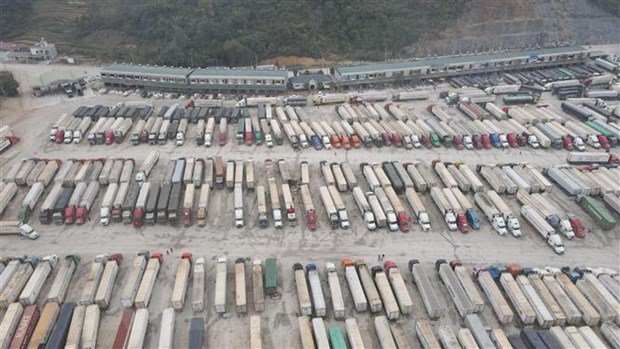
HÀ NỘI — Deputy Prime Minister Lê Văn Thành has requested ministries, sectors and localities to closely coordinate with Chinese agencies to speed up customs clearance, striving to have no congestion of cargo trucks at border gates before Tết (Lunar New Year) holidays.
The Deputy Prime Minister emphasised this task at an online meeting on January 8 between the Government and localities to solve goods still congested at the northern border gates.
This is the second urgent meeting of the Government within 10 days to deal with this situation.
In the past few days, the agencies of the two countries worked closely to open more border gates and increase the working hours for customs clearance of goods.
Local authorities also provided information about goods congestion at the border gates and advised firms to not transport more goods to those sites.
However, the number of trucks congested at the border gates is still high. There are still many trucks from other localities travelling to border gates.
According to the Ministry of Industry and Trade, from the Government's first meeting on this issue on December 26, 2021 until January 7, 2022, the number of trucks lying idle at border gates in the northern provinces was 3,609, down 2,484, including 2,015 trucks at Lạng Sơn's border gates (down 2,189 units), and 1,260 trucks in Quảng Ninh Province (down 295).
The decrease in the number of trucks was mainly thanks to domestic consumption, and also partly to official exports via Hữu Nghị Border Gate, as well as to exports by sea.
Deputy Minister of Industry and Trade Trần Quốc Khánh said border provinces have repeatedly advised firms, but there are still trucks bringing agricultural products, mainly watermelons, to Tân Thanh Border Gate in Lạng Sơn Province with an average number of about 10 trucks per day.
According to Lạng Sơn Province's authorities, after the previous meeting with Deputy Prime Minister Lê Văn Thành, Lạng Sơn Province has requested authorities of other localities nationwide to coordinate in controlling agricultural products exported via its border gates.
Lạng Sơn has also recommended commodity associations, businesses and individuals to temporarily stop transporting goods to the border gates, and at the same time have a plan on promoting domestic consumption and post-harvest processing.
As of the morning of January 8, there were 1,921 goods trucks at the border gates in this province, including 919 trucks transporting fruit.
In the coming days, the Deputy Prime Minister asked the ministries of Industry and Trade, Agriculture and Rural Development, Foreign Affairs, and Finance, customs, authorities of border localities to continue working with Chinese counterparts to create more favourable conditions for customs clearance of goods that are congested at border gates, including an increase of working hours for customs clearance and the number of border gates under operation.
The Deputy Prime Minister asked the Ministry of Agriculture and Rural Development to continuously coordinate with localities, associations and businesses in promoting the processing of agricultural products.
The Ministry of Industry and Trade needs to implement solutions to expand markets and promote domestic consumption, especially via the system of supermarkets, trade centres and traditional markets.
Ministries and sectors, including the railway and maritime sectors, should have measures to promote official exportation and limit unofficial exports.
China has announced the reopening of Pingmeng border gate with Việt Nam’s Sóc Giang border gate in Cao Bằng Province from 10:00 on January 7.
The border gate was reopened just one day after the first meeting of the Working Group on Việt Nam-China Trade Facilitation, the Vietnamese Ministry of Industry and Trade's Asia-Africa Market Department said.
Earlier, the Trà Linh (Việt Nam) - Longbang (China) border gate had also been reopened. — VNS